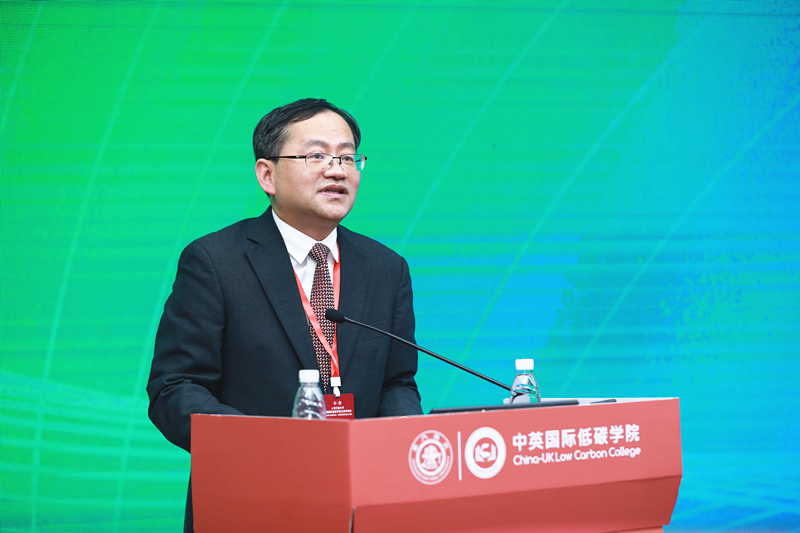On September 18, 2022, 2022 Pujiang Innovation Forum - Low-carbon Future S&T Sub-forum (Carbon Neutrality Forum 2022) was held at LCC. The forum was chaired by Prof. Changying Zhao, Dean of China-UK Low Carbon College of Shanghai Jiao Tong University. The forum also launched a live broadcast and attracted more than 5,000 audiences online.

Prof. Xinyuan Zhu, Vice President of Shanghai Jiao Tong University addressed welcomed remarks and hoped that this forum would become a platform for experts and scholars to exchange ideas for realizing the goals of achieving carbon peak by 2030 and carbon neutrality by 2060.
.png)
Prof. Zhen Huang, Chair Professor of Shanghai Jiao Tong University and Academician of Chinese Academy of Engineering, delivered an academic report on the Significance and Opportunity of the “Double Carbon” Goals. He discussed the significance of achieving carbon peak and carbon neutrality, the logic of energy transition and the opportunities it brings.
.png)
Prof. Jiahua Pan, Member of the Chinese Academy of Social Sciences and Deputy Director of the National Committee of Experts on Climate Change, delivered an academic report on Zero Carbon Transition, Win-Win Development. He pointed out that the revolutionary technological breakthrough of zero-carbon not only accelerates the transition to carbon neutrality, but also benefits the development of employment, growth, security, ecology, etc.
.png)
Prof. Tianshou Zhao, Chair Professor of Southern University of Science and Technology and Academician of Chinese Academy of Sciences, gave an academic report on Innovating Energy Storage Technologies through Interdisciplinary Approach, pointing out that achieving carbon neutrality requires large-scale, long-term energy storage technologies.
.png)
Prof. Xiang Gao, Professor of Zhejiang University and Academician of Chinese Academy of Sciences, gave an academic report on Energy Science and Technology Innovation and Green Low-carbon Development. He pointed out that China is the largest energy producer and consumer in the world, with a large amount of carbon emissions and high intensity. Energy technology innovation is quite urgent.
.png)
Prof. Haisheng Chen, Researcher of Institute of Engineering Thermophysics, Chinese Academy of Sciences, and Vice President and Secretary General, Chinese Society of Engineering Thermophysics, gave an academic report on Advances and Trends in Advanced Compressed Air Energy Storage Technology. He reported the research progress of advanced compressed air energy storage systems, including basic research, key technologies and demonstration power plants, and discussed the future development trends of advanced compressed air energy storage systems.
.png)
Prof. Xiliang Zhang, Director of Institute for Energy, Environment and Economy, Tsinghua University, gave an academic report on Thoughts on Carbon Neutrality and Carbon Markets. He introduced the technical solutions of the world and major countries to achieve carbon neutrality goals.
.jpg)
Prof. Heping Tan from Harbin Institute of Technology, Director of the Institute of Aerospace Thermophysics, gave an academic report on Thermal Radiation Transfer and the "Double Carbon" Construction Plan at HIT. He pointed out that space-based optical detection is the key to realizing space attack and defense, starlight positioning, etc.
.jpg)
Prof. Changying Zhao, Chair Professor of Shanghai Jiao Tong University and Dean of SJTU China-UK Low Carbon College, gave an academic report on Perspectives on Low Carbon Energy Transition Technologies. He analyzed and introduced the energy transformation, discussed the path of low-carbon energy transformation, and introduced relevant technology prospects that support the energy transformation.
.jpg)
Dr. Jianrong Yang, Executive Director, Shanghai Research Institute of Building Sciences Group, gave an academic report on Low Carbon Development and Practice in Construction Engineering. He pointed out that the proportion of carbon emissions in construction-related fields to the carbon emissions of the whole society cannot be ignored.
.png)
Prof. Gareth Harrison, Deputy Head of the School of Engineering, University of Edinburgh, gave an academic report on Climate Impacts on Energy Systems: An Overview. He presented a history of some of the expected activities affecting climate and energy adaptation, described how to assess climate impacts on energy systems and gave examples of climate impacts and energy adaptation.
.png)
Prof. Dan van der Horst from University of Edinburgh gave an academic report on A Review of Demand-Side Measures to Decarbonise Society. He pointed out that in high- and middle-income countries, improving health and well-being does not depend on increased energy consumption, but demand-side measures are not easy to implement, requiring political commitment and management capacity to make them effective and equitable.
LCC Delegation Visits the UK and France
2025-12-16